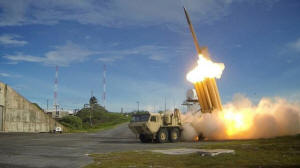|
 China,
Russia urge U.S. to drop Korea missile defense proposal China,
Russia urge U.S. to drop Korea missile defense proposal
 Send a link to a friend
Send a link to a friend
[April 29, 2016]
BEIJING (Reuters) - China and Russia
urged the United States on Friday not to install a new anti-missile
system in South Korea, after Washington said it was in talks with Seoul
in the wake of nuclear arms and missile tests by North Korea.
|
|
 The United States and South Korea have begun talks on possible
deployment of the Terminal High Altitude Area Defense (THAAD) system
after North Korea tested its fourth nuclear bomb on Jan. 6 and
conducted missile tests. The United States and South Korea have begun talks on possible
deployment of the Terminal High Altitude Area Defense (THAAD) system
after North Korea tested its fourth nuclear bomb on Jan. 6 and
conducted missile tests.
The nuclear test and missile launches are in violation of U.N.
resolutions against North Korea backed by Russia and China. U.S. and
South Korean officials have expressed concern that the North could
attempt a fifth nuclear test in a show of strength ahead of its
Workers' Party congress, which begins on May 6.
North Korea test-fired what appeared to be two intermediate range
ballistic missiles on Thursday, but both failed, the U.S. military
said.
Speaking at joint press briefing with Russian Foreign Minister
Sergei Lavrov, Chinese Foreign Minister Wang Yi said the United
States should respect "legitimate concerns" of China and Russia over
the missile system.
 "This move goes beyond the defensive needs of the relevant
countries. If it is deployed it will directly impact China's and
Russia's respective strategic security," Wang said.
"Not only does it threaten the resolution of the peninsula nuclear
issue, it quite possibly could pour oil on the fire of an already
tense situation, and even destroy strategic equilibrium on the
peninsula."
North Korea's actions should not be used as an excuse to make moves
that would escalate tensions, especially the U.S. deployment of an
anti-missile system, Lavrov said, according to an interpretation in
Chinese.
[to top of second column] |

North Korea's drive to develop a nuclear weapons capability has
angered China, Pyongyang's sole major diplomatic and economic
supporter. But Beijing fears THAAD and its radar have a range that
would extend far beyond the Korean peninsula and into China.
Chinese President Xi Jinping said on Thursday that Beijing would not
allow war and chaos to break out on the Korean peninsula.
North and South Korea remain technically at war after their 1950-53
conflict ended in a truce, rather than a treaty. The North routinely
threatens to destroy South Korea and its major ally, the United
States.
(Reporting by Michael Martina; Editing by Nick Macfie)
[© 2016 Thomson Reuters. All rights
reserved.]
Copyright 2016 Reuters. All rights reserved. This material may not be published,
broadcast, rewritten or redistributed.
 |